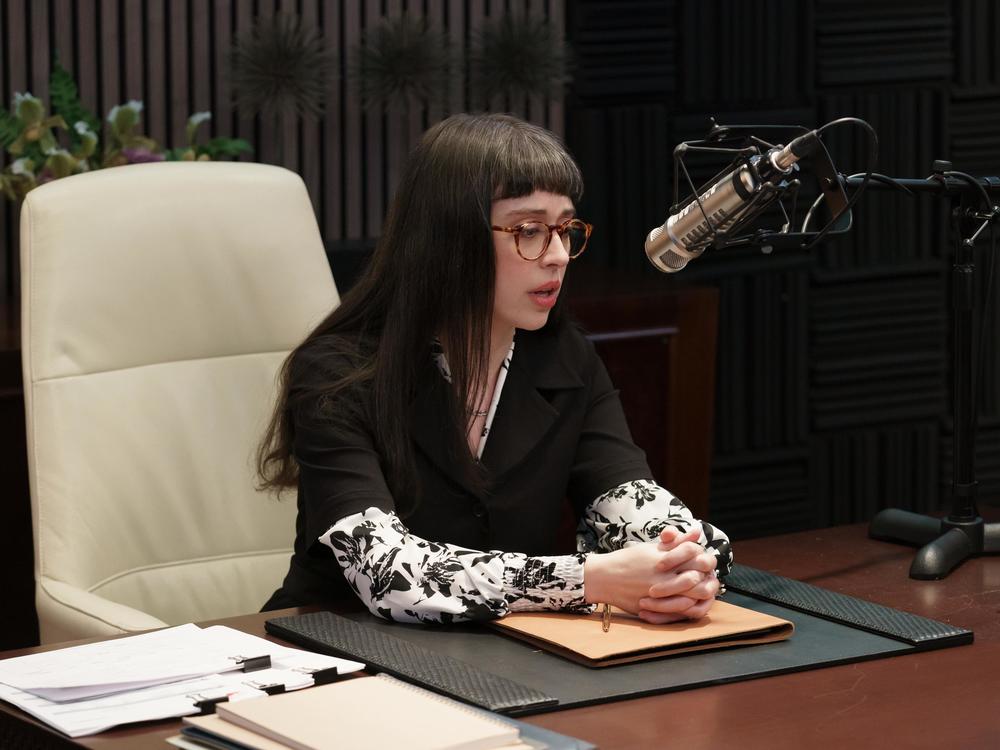Section Branding
Header Content
The rise of the 'Morally Dubious Podcaster' in pop culture
Primary Content
One of this summer's most popular shows centers on a slimy true crime podcaster. Only Murders In the Building, on Hulu, follows three fans of a Serial-like show called All Is Not OK in Oklahoma. By the end of season two, it becomes clear the show's host, played by Tina Fey, may be a cold-blooded murderer herself.
"I need something with famous people, and blood!" she wails to an assistant. "God, I need a murder. A good one!"
Fey's character is just one example of what seems to be a new pop culture archetype.
Call them the morally dubious podcasters.
In the movie Vengeance, B.J. Novak plays a self-serving journalist pitching a podcast about the death of a woman he briefly dated.
Another morally dubious podcaster inserts herself into a crime scene (and the bed of a police officer) in the Showtime series Dexter: New Blood. And in the wry social comedy Rutherford Falls on Peacock, not one but two morally dubious podcasters run amuck, including an NPR reporter who wrecks the life of one of the main characters.
"Ah yes, the morally dubious podcaster," Nicholas Quah chuckles. He covers podcasts for Vulture and New York Magazine and recognized the archetype immediately. "My favorites were the first I ever noticed: the true crime podcasters in 2018's Halloween, who — spoilers — end up being brutally killed for chasing down Michael Myers."
But Quah remembered an even earlier example – from the 2014 Kevin Smith movie Tusk – and says there's a reason TV and movies are serving up so many morally dubious podcasters craven in their pursuit of fame and notoriety. That reason would be real life.
"Look up and down the Apple podcast charts," Quah points out. "You'll find any number of frankly morally dubious true crime shows. People, who in some cases, plagiarize other people's reporting and accessorize it and spread incomplete facts and inconsistent truths. "
Quah has written about these issues with Crime Junkie, one of the most popular podcasts in the country. And of course, the New York Times' podcast, Caliphate, had to be essentially retracted in 2020 when its sensational main subject, who claimed to be a member of ISIS, turned out to be a serial liar.
But morally dubious podcasters go beyond the genre of true crime. The Peacock show, Rutherford Falls, features a smarmy, racist podcaster who fancies himself, as he says, "in the tradition of Plato, Nietzsche and my personal podcasting hero, Mr. Joseph Rogen."
This character personifies what NPR's pop culture podcaster Linda Holmes calls "the yap and slap." People who sound off into a microphone in their basements and throw the results on the internet remind her, she says, of the early days of blogging.
"You can start a podcast tomorrow with very little equipment," she observes. "Just as you could go on the Internet and start a blog. And what you get from that, is a lot of people who are really good and really professional and some celebrities who see it as an easy way to extend their brand and control their own publicity. You have talented people who haven't been welcomed in traditional media spaces."
But you also get grifters, she adds, opportunists and people who don't "follow the rules you would want them to follow." To a certain extent, the morally dubious podcaster is the latest twist on a classic figure – the stranger in town. It's an expository device, a way to frame a story.
But right now, when numerous polls show trust in the media collapsing, the morally dubious podcaster has particular power. You don't know why she's here. Or what she may be mining from your truth.
Copyright 2022 NPR. To see more, visit https://www.npr.org.

